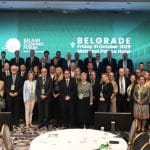This year, 12 of the world’s 20 fastest-growing economies are in Africa, making it the second-fastest-growing region globally – trailing only Asia.
For decades, U.S. engagement with Africa has predominantly relied on traditional aid models that focused on treating symptoms rather than fostering sustainable economic prosperity and viable business partnerships. With the Trump administration’s decision to begin dismantling the U.S. Agency for International Development (USAID), along with several other aid-based agencies, and absorb those functions into the State Department, the pivot from aid to trade and investment has suddenly accelerated from aspiration to necessity.
The redesign of American diplomacy, the new approach to U.S. trade relationships, and the clear alignment between America’s leadership in artificial intelligence (AI) and other digital technologies along with Africa’s collective desire to use technology as a development driver is fundamentally altering the scope of engagement, making it imperative to establish a coherent, commerce-driven approach to U.S.-Africa relations.
In an encouraging development that aligns with these imperatives, the Trump administration has announced plans to host a U.S.-Africa Leaders’ Summit focused on trade and investment later this year, although dates have not been set.
In view of the above, the 17th U.S.-Africa Business Summit held on June 22- 25 in Luanda, Angola reflected the ongoing pivot in U.S. – Africa relations – away from traditional aid and toward commercial diplomacy. With robust participation from African Heads of State and U.S. counterparts, the Summit signified deepening U.S. business ties in Africa, but also highlighting Angola’s role as a strategic entry point.
The Summit featured over 100 sessions, plenaries, and targeted forums which spanned sectors including energy, health, ICT, finance, infrastructure, and agribusiness.
The State Department June 30, 2025, fact sheet summaries the Summit’s key deliverables:
Record-Breaking U.S.-Africa Business Summit Yields $2.5 Billion in Deals and Commitments
From June 22-25, more than 2,700 U.S. and African public and private sector leaders gathered for the 17th U.S.-Africa Business Summit, hosted by the Corporate Council on Africa and the President of Angola. This year’s Summit marked a record turnout, including 12 African Heads of State.
The U.S. Delegation, led by Ambassador Troy Fitrell, Senior Bureau Official for African Affairs, included the senior-most officials advancing U.S. commercial engagement across Africa:
Massad Boulos, Senior Advisor for Africa
Thomas Hardy, Acting Director, U.S. Trade and Development Agency
Constance Hamilton, Assistant U.S. Trade Representative for Africa
Connor Coleman, Head of Investments and Chief of Staff, U.S. International Development Finance Corporation
Tamara Maxwell, Senior Vice President for Small Business, Export-Import Bank of the United States
The record turnout made clear that both U.S. and African leaders share a strong commitment to significantly expanding trade and investment. The U.S. objective at the Summit was to secure key deals and commitments for U.S. companies and establish the conditions to boost U.S. exports and investment in Africa – advancing mutual prosperity in line with the Trump Administration’s Commercial Diplomacy Strategy for Africa.
Key Outcomes: $2.5 Billion in Deals and Commitments
During the Summit, more than $2.5 billion in new deals and commitments between U.S. and African partners were announced, reinforcing the United States’ prioritization of trade over aid in our approach to Africa – engaging Africans as peers and partners in investment-led growth.
Major Deals and Commitments for U.S. Companies:
Amer-Con Corporation & Angolan Cargo and Logistics Certification Regulatory Agency
A U.S. consortium led by Florida-based Amer-Con Corporation signed a Strategic Partnership Agreement with the Angolan Cargo and Logistics Certification Regulatory Agency to construct and operate 22 grain silo terminals along the Lobito Corridor. The project is backed by the U.S. Export-Import Bank and is expected to significantly enhance Angola’s food security and agri-logistics capacity.
Cybastion & Angola Telecom
U.S. technology firm Cybastion and Angola Telecom signed a $170 million investment deal to expand digital infrastructure and cybersecurity through Cybastion’s “Digital Fast Track” initiative, providing local training and modern infrastructure for Angola’s digital transformation.
CEC Africa & AG&P
CEC Africa Sierra Leone Ltd. signed a Memorandum of Understanding to develop West Africa’s first U.S.-sourced LNG terminal, in partnership with AG&P and backed by the U.S. International Development Finance Corporation. The terminal will power the 108MW Nant Power Project in Sierra Leone and enable affordable energy for industrial and household use in Sierra Leone.
Ruzizi III Holding Power Company & Anzana Electric Group
The Ruzizi III Holding Power Company signed an Invitation to Partner with U.S.-based Anzana Electric Group, paving the way for a 10 percent equity stake in a $760 million hydropower project spanning Rwanda and the DRC. The project will deliver reliable energy to 30 million people across the region and promote regional integration and stability.
Ethiopia Investment Holdings and U.S. International Finance Partners
Ethiopia Investment Holdings signed a Memorandum of Understanding with U.S. International Finance Partners to invest more than $200 million in the development of luxury hotels, branded residences, and related tourism infrastructure in Ethiopia. The agreement aligns with the development priorities of Ethiopian President Taye Atske Selassie, who witnessed the signing.
Hydro-Link and the Government of Angola
U.S. energy investor Hydro-Link signed an agreement with the Angolan Government to develop a $1.5 billion private transmission line connecting hydropower sites in Angola to critical mineral mines in the DRC. This 1,150-kilometer transmission corridor will enable the delivery of up to 1.2 gigawatts of reliable electricity from Angola’s Luaca plant and other hydroelectric facilities to the Kolwezi mining region in the DRC, supporting the region’s mining operations and energy needs.







